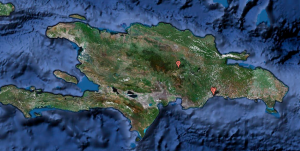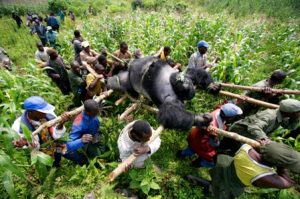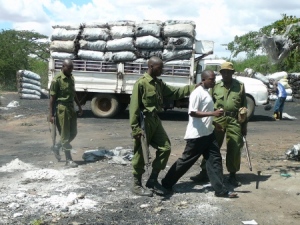 I wonder if the 2006 film Blood Diamond (Leonardo DiCaprio, Jennifer Connelly) would have garnered as much attention if the object of discord had been charcoal instead of diamonds.
I wonder if the 2006 film Blood Diamond (Leonardo DiCaprio, Jennifer Connelly) would have garnered as much attention if the object of discord had been charcoal instead of diamonds.
It’s hard to imagine that charcoal – charcoal! – could be the cause of gruesome murders, a thriving black market, sinister cartels, and the source of funding of irregular armies. But that’s exactly what’s happening in various places around the world and there is every reason to believe things are about to get worse quickly, especially if Copenhagen approves a deal to protect forests in developing countries.
A series of gruesome events over the past few months illustrate the magnitude of the problem.
Murder on the border
Earlier this month, the bodies of four Haitians were retrieved from the Dominican side of the border after they were killed and roasted in a makeshift charcoal kiln. The Haitians were apparently murdered for chopping wood across the border to convert to charcoal for sale back in energy-poor Haiti. With about 98 percent of Haiti’s tree cover gone, Dominican Republic authorities are reporting deeper and deeper incursions by Haitian charcoal-makers into their country’s protected areas. Tensions have risen between both countries over the incident. The killers have yet to be apprehended.
the border after they were killed and roasted in a makeshift charcoal kiln. The Haitians were apparently murdered for chopping wood across the border to convert to charcoal for sale back in energy-poor Haiti. With about 98 percent of Haiti’s tree cover gone, Dominican Republic authorities are reporting deeper and deeper incursions by Haitian charcoal-makers into their country’s protected areas. Tensions have risen between both countries over the incident. The killers have yet to be apprehended.
Gorilla protectors battle charcoal cartels and local militias

 Charcoal is also big business in the eastern border of the Democratic Republic of Congo where local charcoal cartels funnel millions of dollars to irregular armies fighting government forces.
Charcoal is also big business in the eastern border of the Democratic Republic of Congo where local charcoal cartels funnel millions of dollars to irregular armies fighting government forces.
The shocking murder in 2007 of seven mountain gorillas in the DRC’s Virunga National Park was also linked to the local charcoal trade. Virunga is home to the largest remaining population of endangered mountain gorillas.
Earlier this year the park ranger’s main office came under heavy fire for several hour after park authorities detained a local charcoal kingpin. UN armored vehicles intervened to protect the rangers but not before they forced the rangers to release the suspect.
“Follow the trail of charcoal,” says Emmanuel de Merode, the park’s Chief Warden. “Charcoal is the biggest threat to the park.” A sack of charcoal sells for $25 on average. Doing the math De Merode estimates that in 2006, when gorilla tourism brought in less than $300,000, the Virunga charcoal industry was worth more than $30 million.
It is estimated that at the rate that charcoal is harvested from the park, the entire southern portion of the park will be gone in ten years. An area considered to be perhaps the most biologically diverse and best of its kind, may soon vanish.
Aware of these facts, and the local implications, neighboring Rwanda has banished the internal production of charcoal. However, this approach does nothing to mitigate Rwanda’s own internal demand for the product. They just buy it from the Congolese.
A Global trade in Charcoal
 Last week, Kenya’s Forest Service cracked down on illegal charcoal trade after nabbing six three-ton trucks loaded with more than 5,000 bags of charcoal. The operation, involving 15 forest rangers, one commander, two forest officers and the District Forest Officer fined the six trucks KShs 50,000 ($650) each in addition to forfeiting their charcoal load. While not illegal, it is well-known that East African countries export large quantities of charcoal to Middle Eastern countries where wood and charcoal is relatively scarce.
Last week, Kenya’s Forest Service cracked down on illegal charcoal trade after nabbing six three-ton trucks loaded with more than 5,000 bags of charcoal. The operation, involving 15 forest rangers, one commander, two forest officers and the District Forest Officer fined the six trucks KShs 50,000 ($650) each in addition to forfeiting their charcoal load. While not illegal, it is well-known that East African countries export large quantities of charcoal to Middle Eastern countries where wood and charcoal is relatively scarce.
Charcoal production is illegal in several African countries. But with few resources to enforce the law and even fewer fuel alternatives for the impoverished population — 90 pecent of Sub-Saharan Africa depends on biomass for cooking and heating — the charcoal bans encourage a thriving underground network that is rife with corruption and abuse.
REDD meets the Law of Unintended Consequences
The likely approval of a deal in Copenhagen designed to funnel billions to developing nations in exchange for their commitment to protect their forests — a program known as REDD (Reduced Emissions from Deforestation and Degradation) — is likely to further exacerbate the illegal trade in charcoal. The reason is as simple as it is obvious. That’s because the pressure on countries to protect their forests will likely force them to clamp down on charcoal production and woodfuel consumption. Without clear and meaningful plans in place to provide alternative sources of energy to those who depend on wood and charcoal for fuel, REDD is likely to lead to a run up in charcoal prices and greater illegal activities.
Let’s hope REDD negotiators have a copy of the Law of Intended Consequences as they finalize a deal in Copenhagen. Otherwise there’s a good chance we’ll be seeing a remake of Blood Diamonds featuring charcoal this time.

